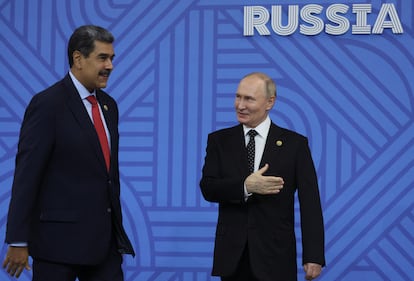Brazil blocked Venezuela’s entry into BRICS due to post-election betrayal
President Maduro considers the Brazilian veto ‘an aggression and a hostile gesture’ but the country is reacting to Maduro’s failure to keep his promise to release electoral records


Vladimir Putin phoned Brazil’s Luiz Inácio Lula da Silva the day he was receiving the heads of state arriving at the BRICS summit. The Brazilian president failed to make it due to a last-minute domestic accident. The two men spoke for 20 minutes. As might be expected, Putin asked about Lula da Silva’s wellbeing. But they also talked about Venezuela, which has been prevented by the Brazilian veto from joining BRICS, the club of countries calling for a less Eurocentric and more multipolar world.
Brazil has made it clear that it vetoed Venezuela’s bid to join BRICS because President Nicolás Maduro abused Lula’s trust after the presidential elections in Venezuela by failing to comply with the promise to present the official results, as explained by Celso Amorim, Brazil’s presidential advisor for international affairs.
President Maduro had traveled to Kazan in southwest Russia for the summit on one of his rare trips outside Venezuela. There, he faced the embarrassment of being denied entry by an absent Lula da Silva in front of Putin and China’s Xi Jinping. Maduro expressed his fury in a statement in which he described the Brazilian veto as “an action that constitutes an aggression against Venezuela and a hostile gesture” as well as “inexplicable and immoral.” The statement, which points an accusing finger at the Foreign Ministry, and not against President Lula da Silva himself, depicts Brazil’s position as a continuation of the boycott implemented against Venezuela by the extreme right-wing Brazilian president Jair Bolsonaro.
“We are familiar with Brazil’s position, we do not agree,” Putin said in his closing BRICS speech. “Venezuela is fighting for its survival. I know President Lula, a very decent and honest man. I am sure he will address the situation as such. He asked me to talk to Maduro. I hope the situation will be resolved.”
Putin is Maduro’s main economic and diplomatic supporter, along with China’s Xi Jinping, and was in favor of welcoming Venezuela into BRICS, but this can only happen when there is consensus among the club’s partners.
BRICS is already a nine-member club and has now accepted 13 more countries as members, making it three times as big as the G7. Its members have a collective GDP amounting to less than that of the G7 — 26% of the global total against almost 43% — but with more purchasing power parity — 35% against almost 30%, according to IMF data.
Brazil’s former foreign minister, Amorim explained the veto in these terms: “The problem with Venezuela [in the BRICS] has nothing to do with democracy, but with a breach of trust. The breach of trust was serious. They promised us something and it was not done,” he told the Brazilian newspaper O Globo.
President Lula sent Amorim to Caracas to monitor the July 28 presidential elections on the ground. The day after the elections, the Brazilian envoy went to the Miraflores palace to meet Maduro and the latter, according to O Globo, promised to make public the records that would prove there had been no election fraud as was widely suspected.
Shortly after, the opposition in Venezuela published digitalized copies of more than 80% of the tally sheets, which indicated a landslide victory for Edmundo González. For weeks, Brazil — together with Colombia, Mexico and the U.S. — demanded the documentation from Maduro, which he failed to produce.
In Brazil, it is a given that Maduro will be sworn in for a third term on January 10 and that bilateral relations between the two countries will be frozen — Brazil rules out a complete cessation of relations. It is not its style.
Just last year, Lula organized a summit of South American presidents in Brasília in an attempt to break the international isolation of Maduro and Chavismo. But that now seems a long time ago.
Sign up for our weekly newsletter to get more English-language news coverage from EL PAÍS USA Edition
Tu suscripción se está usando en otro dispositivo
¿Quieres añadir otro usuario a tu suscripción?
Si continúas leyendo en este dispositivo, no se podrá leer en el otro.
FlechaTu suscripción se está usando en otro dispositivo y solo puedes acceder a EL PAÍS desde un dispositivo a la vez.
Si quieres compartir tu cuenta, cambia tu suscripción a la modalidad Premium, así podrás añadir otro usuario. Cada uno accederá con su propia cuenta de email, lo que os permitirá personalizar vuestra experiencia en EL PAÍS.
¿Tienes una suscripción de empresa? Accede aquí para contratar más cuentas.
En el caso de no saber quién está usando tu cuenta, te recomendamos cambiar tu contraseña aquí.
Si decides continuar compartiendo tu cuenta, este mensaje se mostrará en tu dispositivo y en el de la otra persona que está usando tu cuenta de forma indefinida, afectando a tu experiencia de lectura. Puedes consultar aquí los términos y condiciones de la suscripción digital.








































